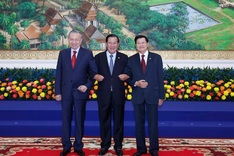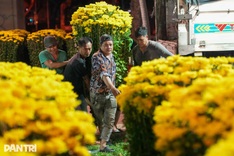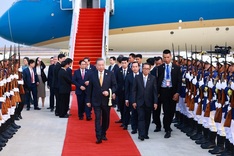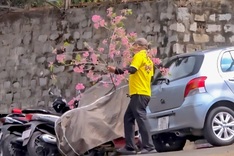
Medical team of the Viet Duc Friendship Hospital perform the simultaneous heart-lung transplant on a patient with multiple organ failure. Photo courtesy of the hospital
The Viet Duc Friendship Hospital International Scientific Conference 2025 served as a platform for Vietnamese and international experts to share updates, strengthen collaboration and improve patient care. Under the theme “The role of surgery and organ transplantation in the era of global integration,” discussions focused on organ transplantation, hepatobiliary surgery, cardiovascular-thoracic care, urology, digestive surgery, obstetrics and gynaecology, trauma and wound healing.
Dr Duong Duc Hung, Director of Viet Duc Friendship Hospital, said Vietnam has made major progress in the past two decades, especially the last ten years, with surgical techniques increasingly aligned to global standards. Liver transplant procedures, for example, have been shortened from 12-14 hours to roughly six or seven, helping reduce complications and recovery time.

Dr Duong Duc Hung, Director of Viet Duc Friendship Hospital, speaks at the event. Photo courtesy of the hospital
He added that Vietnam is actively researching and refining transplant techniques. Beyond learning from overseas experts, Vietnamese surgeons now contribute to international knowledge-sharing initiatives. The rise in procedures, particularly liver transplants, also reflects greater awareness and willingness among the public to donate organs.
According to Dr Nguyen Trong Khoa, Deputy Director of the Department of Medical Services Administration, recent media campaigns have played an important role in boosting public registrations. The number of registered organ and tissue donors has risen from only 265 in 2014 to 129,711. As of April 2025, 30 hospitals are recognised for organ retrieval and transplantation; 85 facilities have been trained in organ donation and brain-death evaluation; and 12 institutions are licensed to operate tissue banks.

Dr Nguyen Trong Khoa, Deputy Director of the Department of Medical Services Administration, Ministry of Health, speaks at the event. Photo courtesy of the hospital
Ministry of Health data shows Vietnam has carried out 9,805 transplants, including 8,904 kidney transplants, 754 liver transplants, 126 heart transplants, 13 lung transplants, three upper-limb transplants, two intestinal transplants and hundreds of tissue procedures, including corneal, skin and stem-cell transplants. Officials consider these achievements a strong breakthrough, with success and survival rates rising.
Dr Khoa said Vietnam has completed complex multi-organ transplants with outcomes comparable to countries in the region. Tissue banks, transplant centres and coordination facilities have now been established nationwide.
Legal reform to expand donation sources
Experts at the conference also highlighted proposed amendments to the 2006 Law on Donation, Removal and Transplantation of Human Tissues, Organs and Cadavers. One key proposal would allow organ donation after brain death for people under 18, with parental or guardian consent. Another would recognise circulatory death to expand donation sources.
The draft also seeks to simplify forensic requirements for diagnosing brain death and add imaging specialists to the assessment process. It would further provide a legal basis for regenerative medicine while enforcing safeguards against commercialisation. It also outlines rules for managing and using stem cells, blood and stem-cell products.
Dr Hung stressed that revisions are needed to modernise transplantation policy, streamline donation procedures and clearly define brain-death criteria. Viet Duc Friendship Hospital, he said, will continue sharing expertise and training to strengthen capacity across the health system. He noted that hospitals wishing to perform transplantation must continue investing in infrastructure, equipment and specialised training to meet rising demand.




















